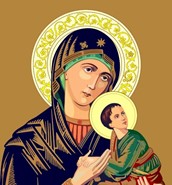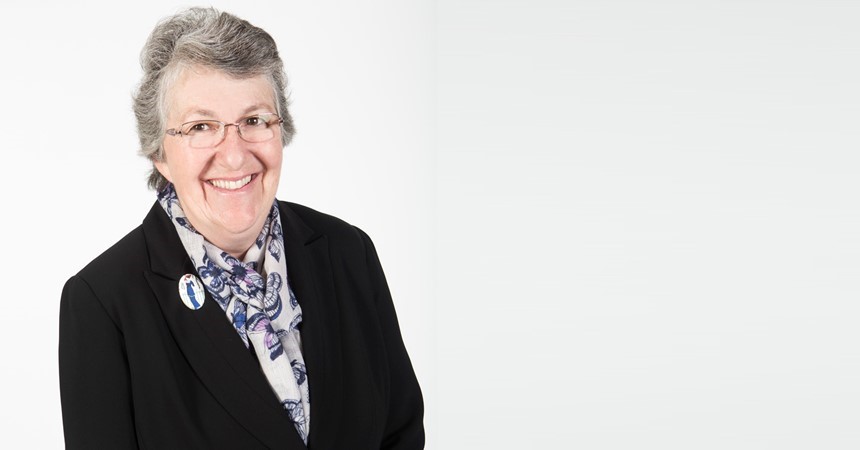On our website, can be found the prayers and readings for this day and so I begin my message with one of the prayers suggested for this day:

 Lord our God, in the Blessed Virgin Mary, Mother of Perpetual Help, Patron of the Church of Maitland-Newcastle; You have shown us a disciple who is faithful to your Word. Open our hearts to receive your saving word, so that, by the power of your Holy Spirit, it may direct our daily living to bring forth a rich harvest of holiness. We pray through our Lord Jesus Christ, your Son, who lives and reigns with you, in the unity of the Holy Spirit, for ever and ever. Amen.
Lord our God, in the Blessed Virgin Mary, Mother of Perpetual Help, Patron of the Church of Maitland-Newcastle; You have shown us a disciple who is faithful to your Word. Open our hearts to receive your saving word, so that, by the power of your Holy Spirit, it may direct our daily living to bring forth a rich harvest of holiness. We pray through our Lord Jesus Christ, your Son, who lives and reigns with you, in the unity of the Holy Spirit, for ever and ever. Amen.
I am always conscious of the stories of women in our Scriptures and throughout history, who, like Mary, have responded to God’s call by saying ‘Yes’, mostly when it was not convenient or wished for. I am grateful to the many women who have been active parts of my own formation, and for those who continue to do so here in the diocese. I feel blest to have met many women of great faith who have nurtured and mentored me.
Certainly, the place of woman in our present-day church has created a lot of dialogue in both the Plenary Council and Diocesan Synod consultation, dialogue, discernment and documentation. I quote from one of our Leadership and Structure Foundational Statements:
We welcome Pope Francis’ insistent call for a synodal Church that involves the whole of the People of God in its life and mission.
….we need to create still broader opportunities for a more incisive female presence in the Church. Because the feminine genius is needed in all expressions in the life of society, the presence of women must also be guaranteed in the workplace and in the various other settings where important decisions are made, both in the Church and in social structures (Evangelii Gaudium n.103)
And then in the Recommendations:
Participation of Women
LS3.1 That the Diocese acknowledges and affirms the innate dignity and equality of women by virtue of their baptism and their right to participate in leadership, decision making and ministry.
There are many women involved in ministry across our diocese in voluntary and paid positions. Like me, they continue to discern God’s call and their vocation. During the past week, I sat with some of these women as well as a few men as we did the first unit of the Graduate Certificate in Mission and Culture, the Mission Imperative. The group of almost thirty of us pondered, with our lecturer, Fr Jamie Calder SJ, what God’s mission means for us in our present context as parishioners, teachers, early educators, educational leaders, those working in Pastoral Ministries and Priests.
I am also blest in Pastoral Ministries, to be in ministry with a number of women who go out each day on mission as leaders in our Church to spread the Good News in one of our Five Foundations:
- Identity and Community
- Worship and Prayer
- Formation and Education
- Mission and Outreach
- Leadership and Structure
As I write this message and you read it, Rose McAllister, our Manager for Formation and Education in the Diocese, is leading our diocesan spiritual pilgrimage of five days, the aMeN caMiNo, along with Helene O’Neill. This experience will be run five times this year with groups of people from across our Diocese. If you wish to know more about this, please view the video on our diocesan website.
I quote from you from the Plenary Council’s Instrumentum Laboris on the section titled The Contribution of Women:
The contribution and role of women within the Church in Australia cannot be overestimated. Religious women make up nearly three-quarters of consecrated Religious and women make up more than three-quarters of all Church employees. Lay women lead and serve in families, parishes, schools, health and aged care institutions, lay associations and ecclesial movements, and many areas of service and works of the Church. (n. 54)
And then in the section on The Call to Co-respon sibility in the Church:
sibility in the Church:
It is a fact today that lay women and men already hold significant positions of leadership in many Church ministries including education, health and social outreach, faith formation, diocesan administration and in other forms of service and oversight. It is open to the Plenary Council to explore ways in which this co-responsibility might be formalised and expanded, and the ways in which women in particular might be more fully involved in all aspects of the Church’s life while upholding the Church’s teachings on the nature of ordained ministry in the Catholic Church. (n. 127)
I am sorry when I hear some in our church who think this emphasis on women has attached to it a feminist or an anti-male agenda. I don’t believe that to be the case. The gifts, stories, voices and contributions of women have been silenced for too long and those in the Church and society at large are being invited to listen and engage more fully, not for the feminine to dominate but to be in partnership with it.
God made people according to the image of God, male and female, God created them (Genesis 1:27)
There is neither Jew nor Greek, there is neither slave nor free, there is neither male nor female; for you are all one in Christ Jesus. (Galatians 3:28)
May the Kingdom of God continue to be realised as we journey through our week.
Teresa Brierley
Director Pastoral Ministries
29 June 2021

